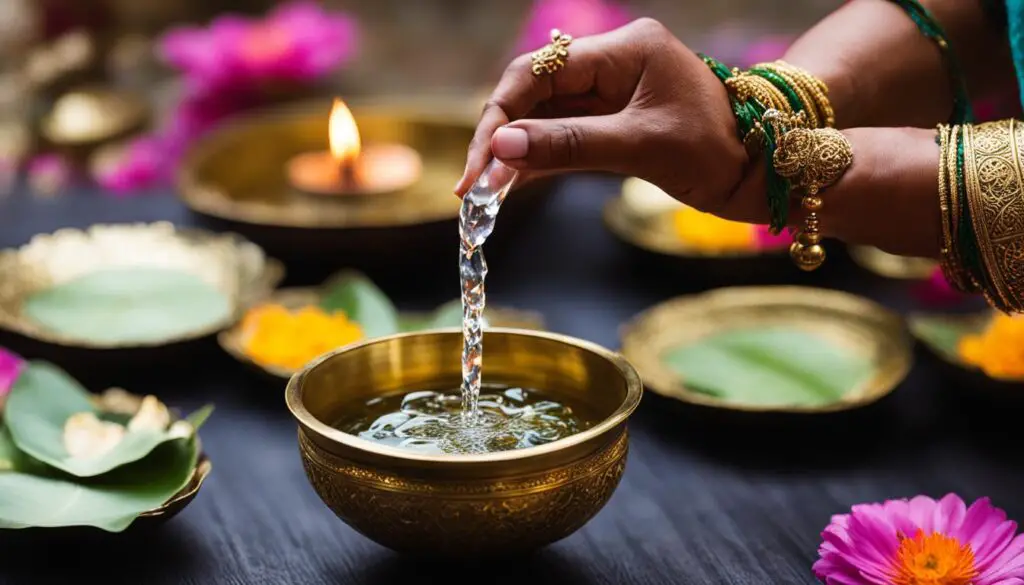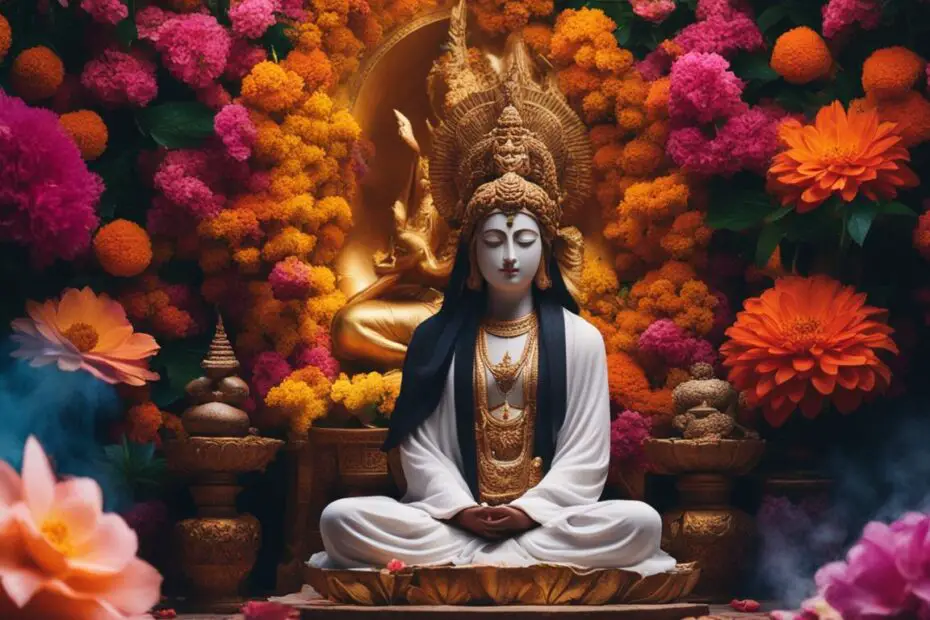Hinduism encompasses a rich tapestry of rituals and practices, with prayer being a significant aspect of the religion. In this article, we will delve into the spiritual significance of prayer in Hinduism, exploring its types, benefits, and the role it plays in the lives of devotees.
Key Takeaways:
- Hindu prayer is a significant aspect of the religion, offering devotees a means to connect with the divine.
- Prayer in Hinduism takes various forms, including chants, mantras, and rituals.
- Devotees offer prayers for peace, blessings, and healing.
- Water holds immense significance in Hindu prayer, symbolizing purity and spiritual purification.
- Prayer in Hinduism aligns with the ultimate goal of self-realization and achieving liberation.
Spiritual Significance of Hindu Prayer
Prayer holds deep spiritual significance in Hinduism. It serves as a means for devotees to establish a profound connection with the divine and seek purification of the soul. Through prayer, devotees express their devotion, surrender to the divine will, and seek blessings for themselves and others. It is a way of renewing and rejuvenating the spirit, as well as expressing gratitude for the blessings received.
The Divine Connection in Hindu Prayer
Hindu prayer is a powerful tool for cultivating a divine connection. It allows devotees to transcend the physical realm and reach out to the divine consciousness within and beyond. The act of prayer helps individuals align their thoughts, emotions, and actions with the spiritual aspect of their being, fostering a sense of unity with the divine. It is through this connection that devotees seek guidance, solace, and profound spiritual experiences.
Furthermore, prayer in Hinduism emphasizes the purification of the soul. It is believed that prayer helps cleanse the mind, body, and spirit of negative energies, impurities, and past karmic burdens. By surrendering to the divine through prayer, devotees seek spiritual purification and aspire to attain a state of inner harmony and peace.
“Prayer is not asking. It is a longing of the soul. It is daily admission of one’s weakness. It is a bettering of one’s spirit. It is better in posture and better in method.”
Prayer in Hinduism also offers a platform for devotees to seek blessings for themselves and others. It is an act of humility, surrendering to a higher power and acknowledging that everything in life is ultimately in the hands of the divine. By seeking blessings through prayer, devotees hope to receive divine guidance, protection, healing, and prosperity in various aspects of their lives.
An important aspect of Hindu prayer is seeking spiritual purification. Prayer allows individuals to purify their thoughts, actions, and intentions, fostering inner growth and transformation. By engaging in prayer regularly, devotees aim to cleanse their minds of negative emotions, such as anger, greed, and attachment, and cultivate virtues like love, compassion, and forgiveness.
Through prayer, devotees strive to purify their consciousness and elevate their spiritual vibrations. It is a way of aligning oneself with the divine attributes and seeking to embody them in daily life. By purifying the mind and heart through prayer, individuals can experience a sense of clarity, peace, and spiritual awakening.
Blessings through Prayer
Blessings play a significant role in Hindu prayer. By offering heartfelt prayers, devotees seek divine intervention and blessings for themselves and others. It is believed that through prayer, devotees can receive the grace of the divine, which can bring positive outcomes in various aspects of life.
Hindu prayer for blessings encompasses a wide range of desires and aspirations, including health, happiness, success, knowledge, and spiritual growth. As devotees express their sincerest prayers and intentions, they hope to receive the divine blessings that can guide, protect, and uplift them on their spiritual journey.
| Blessings | Benefits |
|---|---|
| Health | Physical and mental well-being |
| Happiness | Emotional fulfillment and contentment |
| Success | Achievement of goals and aspirations |
| Knowledge | Spiritual growth and enlightenment |
Hindu prayer provides a powerful means of connecting with the divine, seeking purification, and receiving blessings. It serves as a spiritual practice that nourishes the soul, fosters growth, and cultivates a profound sense of connection with the divine consciousness.
Types of Hindu Prayer
Hindu prayer encompasses a diverse range of practices, each with its unique significance and purpose. Here, we explore some of the key types of Hindu prayer:
Chanting
Chanting is a common form of Hindu prayer, involving the rhythmic repetition of sacred sounds or verses. It is believed that these sounds have a powerful vibrational impact on the body and mind, leading to spiritual transformation and heightened awareness. The chanting of mantras, such as the revered syllable ‘Om,’ is a widely practiced form of Hindu prayer that helps devotees connect with the divine and attain inner peace.
Mantras
Mantras are sacred phrases or prayers that devotees recite during Hindu prayer rituals. These mantras often invoke the names of specific deities and are believed to carry their divine energy and blessings. Each mantra holds a specific purpose and is chanted with the intention of seeking blessings, protection, or spiritual enlightenment. The recitation of mantras is considered a powerful tool for focusing the mind, cultivating devotion, and deepening the connection with the divine.
Rituals
Hindu prayer rituals involve a wide range of practices performed with reverence and devotion. These rituals can vary depending on the deity being worshiped, the occasion, or the specific purpose of the prayer. Rituals may include offering flowers, lighting incense, performing symbolic gestures, or pouring water (abhiseka) on the idols. These rituals not only help in establishing a connection with the divine but also serve as a way to express devotion, gratitude, and surrender.
Devotional Practices
In addition to chanting, mantras, and rituals, Hindu prayer also encompasses various devotional practices. Bhakti yoga, the path of devotion, is a central aspect of Hinduism and involves offering love and devotion to the divine. Devotees may engage in singing devotional hymns (bhajans), reading sacred scriptures, participating in religious processions, or engaging in acts of selfless service as a form of prayer.
“Chanting is a powerful practice that helps devotees connect with the divine and attain inner peace.”
| Type of Prayer | Description |
|---|---|
| Chanting | Rhythmic repetition of sacred sounds or verses |
| Mantras | Recitation of sacred phrases or prayers |
| Rituals | Performance of symbolic gestures and offerings |
| Devotional Practices | Acts of love, devotion, and selfless service |
Hindu Prayers for Peace
In Hinduism, prayer plays a vital role in seeking peace and harmony both within oneself and in the world. Devotees offer prayers and perform spiritual practices to cultivate inner peace and promote peace in their surroundings. Various mantras and chants are recited to invoke peace and harmony, creating a sense of calm, tranquility, and unity among all beings.
“Peace comes from within. Do not seek it without.” – Buddha
In the quest for peace, Hindus turn to prayer as a means to connect with the divine and find solace. Spiritual practices for peace often include meditation, recitation of peace mantras, and participation in collective prayer gatherings. These practices not only provide personal comfort but also contribute to the collective consciousness of peace, fostering an environment of harmony and understanding.
The Power of Prayer for Peace
Prayer has a transformative nature, allowing individuals to shift their focus from personal concerns to broader, universal aspirations. It instills a sense of compassion, empathy, and unity, promoting peaceful coexistence and a sense of shared responsibility towards creating a better world. Through prayer, Hindus seek to create inner peace that radiates outward, inspiring others to embrace peace as well.
Ultimately, Hindu prayers for peace reflect the deep-rooted belief that peace is a fundamental aspect of spiritual growth and the well-being of humanity. It is through the sincere practice of prayer that devotees strive to create a peaceful state of mind and contribute to the establishment of peace in the world.

| Type of Prayer | Significance |
|---|---|
| Peace Mantras | Recitation of specific mantras believed to invoke peace and harmony. |
| Collective Prayer Gatherings | Participation in group prayers to amplify the intentions for peace. |
| Meditation | Practice of stillness and inner reflection to cultivate peace within. |
| Offering Prayers to Peaceful Deities | Devotion to deities associated with peace, such as Lord Vishnu and Goddess Saraswati. |
In conclusion, Hindu prayers for peace encompass a range of spiritual practices aimed at fostering inner peace and promoting peace in the world. Through the recitation of mantras, participation in collective prayer gatherings, meditation, and devotion to peaceful deities, Hindus seek to create a harmonious and compassionate environment. These prayers not only contribute to personal well-being but also inspire others to embrace peace and work towards a more harmonious world.
Hindu Prayers for Blessings
Hindu prayer is a powerful practice that is often undertaken to seek blessings from the divine. Devotees offer prayers to deities and express their desires and wishes, seeking divine intervention and guidance in various aspects of their lives. The act of prayer is seen as a means to establish a connection with the divine and invoke divine blessings.
Through prayer, Hindus believe that they can gain the favor and blessings of the gods and goddesses they worship. It is a way to express gratitude, surrender to the divine will, and seek divine protection and support. Hindus understand that the blessings received through prayer can have a profound impact on their lives, bringing positive outcomes, success, and fulfillment of their desires.
Whether it is for personal growth, health, relationships, career, or any other aspect of life, Hindu prayer for blessings is a way to seek divine guidance and support. It is a reminder of the belief in a higher power and the belief that the divine can intervene in human affairs. Through prayer, devotees express their faith and devotion, seeking the blessings that can bring about positive changes and bring them closer to their goals.
Table: Examples of Hindu Prayers for Blessings
| Deity/Aspect of Blessing | Prayer Example |
|---|---|
| Ganesha (Remover of Obstacles) | “Om Gam Ganapataye Namaha” |
| Lakshmi (Goddess of Wealth) | “Om Shreem Maha Lakshmiyei Namaha” |
| Saraswati (Goddess of Knowledge) | “Om Aim Saraswatyai Namaha” |
| Shiva (Lord of Destruction and Transformation) | “Om Namah Shivaya” |
| Durga (Goddess of Power and Protection) | “Om Dum Durgayei Namaha” |
Note: These are just a few examples of prayers addressed to specific deities for blessings in various aspects of life. Devotees may choose different prayers based on their personal beliefs and the blessings they seek.
Hindu Prayers for Healing
Hindu prayer encompasses a wide range of practices that aim to bring healing to the body, mind, and spirit. Devotees believe in the power of prayer to invoke divine intervention and promote physical and emotional well-being. Healing through prayer is an integral part of Hinduism, with various rituals, mantras, and offerings dedicated to seeking divine healing.
One of the key aspects of Hindu prayer for healing is the recitation of healing mantras. These sacred chants are believed to carry a divine energy that can restore balance and harmony within the individual. Mantras like the Mahamrityunjaya mantra, which is dedicated to Lord Shiva, are often chanted to seek protection and healing from physical ailments.
In addition to mantras, devotees also offer special prayers to specific deities known for their healing abilities. These prayers are accompanied by rituals and offerings, such as the lighting of candles or the offering of flowers. It is believed that these acts of devotion and surrender can invoke divine healing energy and promote overall well-being.
“The power of Hindu prayer for healing lies in the faith and devotion of the devotee. It is a spiritual practice that empowers individuals to connect with the divine and seek solace in times of physical or emotional distress.”
| Deity | Type of Healing |
|---|---|
| Goddess Durga | Protection and physical healing |
| Lord Hanuman | Strength and healing of body and mind |
| Goddess Lakshmi | Abundance and prosperity |
Hindu prayer for healing extends beyond the individual, with prayers also dedicated to the healing of others and the world. Devotees offer prayers for the well-being of loved ones, communities, and the global community as a whole. This collective prayer for healing aims to create a ripple effect of positive energy and bring about healing on a larger scale.
Overall, Hindu prayer for healing is a deeply personal and spiritual practice that seeks to harness the power of divine energy for physical, mental, and spiritual well-being. It is a reminder of the interconnectedness of all beings and the profound belief in the ability of prayer to bring about positive transformation and healing.
The Significance of Water in Hindu Prayer
In Hinduism, water holds immense significance in the context of prayer and worship. It is considered a sacred element that symbolizes purity, cleansing, and spiritual purification. Water rituals are an integral part of Hindu worship, serving as a means to establish a connection with the divine and express reverence.
Water is used in various ways during Hindu prayer, such as the pouring of water on idols (abhiseka) as a form of respect and devotion. This act represents the belief in the divine qualities of water and its ability to purify not only the physical body but also the mind and soul. The sacredness of water in Hindu prayer reinforces the idea of spiritual cleansing and renewal.
“Water is the most essential element, without which life cannot exist. It is considered the source of all creation and the universal solvent that dissolves impurities.”
Furthermore, water is offered to deities as a significant part of Hindu prayer rituals. The act of offering water, known as Arghya, is considered a gesture of gratitude, respect, and devotion. It is believed that the water carries the devotee’s prayers and blessings, serving as a conduit between the earthly realm and the divine presence.
Overall, the significance of water in Hindu prayer highlights the belief in its purifying properties and its role in establishing a spiritual connection. It symbolizes the devotee’s reverence, gratitude, and longing for spiritual growth and transformation.
| Water Rituals in Hinduism | Sacredness of Water in Hindu Worship |
|---|---|
| Pouring water on idols (abhiseka) | Water symbolizes purity and spiritual cleansing |
| Offering water to deities (Arghya) | Water as a conduit for prayers and blessings |
| Bathing in holy rivers during pilgrimages | Cleansing sins and purifying the soul |

The Spiritual Symbolism of Water
Water, with its fluid nature, is often seen as a metaphor for the flow of life, emotions, and consciousness. It represents the ever-changing nature of existence and the importance of adaptability and flexibility on the spiritual path.
In Hindu symbolism, water is associated with the divine feminine energy and is considered a source of nourishment and sustenance. It is believed to possess transformative qualities, capable of healing and rejuvenating the body, mind, and spirit.
Water’s significance in Hindu prayer goes beyond its physical properties. It carries spiritual symbolism that reflects the devotee’s yearning for purification, spiritual growth, and union with the divine.
The Role of Pilgrimage in Hindu Prayer
Hindu prayer encompasses a wide range of practices, and pilgrimage holds a significant place in this spiritual journey. Pilgrimage involves undertaking a sacred journey to specific sites, temples, or holy rivers that hold spiritual significance in Hinduism. These pilgrimages serve as an opportunity for devotees to connect with the divine, seek blessings, and deepen their spiritual practice.
Pilgrimages in Hinduism are not merely physical journeys; they are a means of spiritual transformation and growth. The act of embarking on a pilgrimage is symbolic of surrendering one’s ego and worldly attachments, allowing devotees to focus their attention on the divine and their spiritual aspirations. The sacredness of the pilgrimage sites is believed to enhance one’s connection with the divine, making it a conducive environment for spiritual practices such as prayer, meditation, and rituals.
Throughout history, numerous sites in India have become renowned pilgrimage destinations, attracting millions of devotees from all over the world. Some of the most sacred pilgrimages include the Char Dham Yatra, which encompasses the journey to the holy sites of Yamunotri, Gangotri, Kedarnath, and Badrinath, and the Kumbh Mela, a massive gathering of devotees who come together to bathe in the sacred rivers of India to cleanse their sins and seek spiritual purification.
The Spiritual Significance of Pilgrimage
“The pilgrimage journey is not merely a physical one; it is an inward journey of self-discovery and spiritual transformation.”
Pilgrimage holds profound spiritual significance in Hindu prayer. It allows devotees to detach from the distractions of daily life and immerse themselves in a focused spiritual practice. The journey itself is seen as a purification process, where devotees leave behind their worldly attachments and dedicate themselves to the divine. The physical challenges and sacrifices made during the pilgrimage are seen as offerings and acts of devotion, further deepening the bond between the pilgrim and the divine.
Pilgrimages also serve as a way to honor the divine and express gratitude for the blessings received. By visiting sacred sites and participating in rituals, devotees seek to strengthen their relationship with the divine and seek guidance on their spiritual path. The energy and vibrations of these sacred places are believed to have a transformative effect on the pilgrims, helping them to overcome obstacles, gain inner clarity, and experience spiritual growth.
| Pilgrimage Site | Location | Significance |
|---|---|---|
| Varanasi | Uttar Pradesh, India | One of the holiest cities for Hindus, where bathing in the Ganges River is believed to cleanse sins. |
| Amarnath | Jammu and Kashmir, India | The cave shrine of Lord Shiva, where an ice stalagmite forms naturally and is considered a manifestation of Lord Shiva’s presence. |
| Tirupati | Andhra Pradesh, India | Home to the Tirumala Venkateswara Temple, one of the most visited and richest temples in the world. |
Pilgrimage in Hindu prayer is a deeply personal and transformative experience. It allows devotees to transcend the physical realm and connect with the divine on a profound level. The journey itself becomes a spiritual practice, helping individuals deepen their devotion, seek blessings, and experience a sense of unity and oneness with the divine.

Water as an Offering in Hindu Prayer
In Hinduism, water holds great reverence and is often used as an offering during prayer rituals. This act of offering water, known as Arghya, carries deep symbolism and significance. It is believed that water is a pure and sacred element that can carry the devotee’s prayers and blessings to the divine.
During the Arghya ritual, devotees offer water to deities by pouring it into a sacred vessel or directly onto an idol. This act is accompanied by prayers, mantras, and the ringing of bells, creating a serene and devotional atmosphere. The water offered is seen as a gesture of respect, devotion, and gratitude towards the divine.
After the offering, the water is considered blessed and carries the divine energy. Devotees may consume the blessed water as a symbol of receiving the divine blessings or use it for personal purification and spiritual cleansing. It is believed that this act of offering water not only nourishes the body but also purifies the mind and soul, creating a deeper connection with the divine.
| Symbolism of Water in Hindu Prayer | Meaning |
|---|---|
| 1. Purity | Water is a symbol of purity and cleansing, representing the purification of the devotee’s body, mind, and soul. |
| 2. Surrender | The act of offering water is an act of surrendering oneself to the divine will and seeking guidance and blessings. |
| 3. Gratitude | Offering water expresses gratitude to the divine for the blessings received and a acknowledgment of the abundance in one’s life. |
| 4. Consciousness | Water symbolizes the flow of consciousness and the eternal nature of the soul, reminding devotees of their divine essence. |
Water as an offering in Hindu prayer is a beautiful and profound practice that allows devotees to connect with the divine on a deep spiritual level. Through this act of reverence and devotion, devotees seek purification, blessings, and a closer relationship with the divine.

The Distinction Between Spirituality and Adhyatma in Hindu Prayer
In the context of Hindu prayer, it is important to understand the distinction between spirituality and adhyatma. While both concepts relate to the search for a higher purpose and self-realization, they have different origins and meanings in Hindu philosophy.
Spirituality is a broader term that encompasses diverse belief systems and practices aimed at seeking a deeper connection with something higher or transcendent. It can be pursued through various paths, religions, and philosophies, allowing individuals to explore different approaches to spirituality and find their own unique spiritual journey.
On the other hand, adhyatma is deeply rooted in Hindu philosophy and specifically refers to the spiritual traditions and practices found in Hindu scriptures. It delves into the study of the self, the nature of consciousness, and the recognition of the eternal self or soul. Adhyatma involves exploring the depths of one’s consciousness, transcending the limitations of the physical body and ego, and connecting with the eternal essence within.
| Spirituality | Adhyatma |
|---|---|
| Broader term encompassing diverse belief systems and practices | Specific to Hindu philosophy and scriptures |
| Explores various paths and approaches to spirituality | Focuses on self-realization and connection with the eternal self |
| Transcends cultural and religious boundaries | Rooted in Hindu philosophy and scriptures |
| Seeks a deeper connection with something higher or transcendent | Explores the nature of consciousness and the eternal essence within |
Both spirituality and adhyatma play significant roles in Hindu prayer, offering devotees different paths to seek a higher purpose, self-realization, and unity with the divine. Whether one follows a spiritual approach or delves into the depths of adhyatma, the ultimate goal remains the same – to discover the eternal self and attain liberation from the cycle of birth and death.
The Concept of Adhyatma in Hindu Prayer
Adhyatma, often translated as “spiritual science” or “self-knowledge” in Hindu philosophy, holds a central place in the practice of Hindu prayer. It delves into the depths of self-realization and the understanding of the eternal self or soul. Adhyatma seeks to transcend the limitations of the physical body and ego, connecting with the eternal essence within.
This concept is intricately woven into the spiritual teachings and practices found in Hindu scriptures like the Vedas, Upanishads, and Bhagavad Gita. These texts serve as guides for individuals on their journey of self-discovery and awakening. Adhyatma provides a framework for exploring the profound mysteries of existence and seeking higher states of consciousness.
Through the study and application of spiritual principles, individuals can gain insights into the nature of reality, the purpose of life, and the interconnectedness of all beings. It encourages self-reflection, introspection, and meditation as tools for attaining self-knowledge. Adhyatma offers a path to liberation, guiding devotees to transcend the cycle of birth and death and attain moksha, eternal bliss and unity with the divine.
| Key Concepts of Adhyatma in Hindu Prayer | Explanation |
|---|---|
| Self-Realization | Recognition of the eternal self or soul, reaching a state of self-awareness and understanding of one’s true nature. |
| Spiritual Science | Exploration of spiritual principles and practices that lead to self-discovery and the realization of higher truths. |
| Hindu Scriptures | Vedas, Upanishads, and Bhagavad Gita as sources of wisdom and guidance on the path of self-realization. |
| Transcendence | Going beyond the limitations of the physical body and ego to connect with the eternal essence within. |
| Moksha | Attainment of liberation, freedom from the cycle of birth and death, and union with the divine. |
“The path of Adhyatma leads to self-realization, a profound journey of understanding the eternal self and connecting with the divine essence within. It is through this spiritual science that seekers can transcend the limited perspective of the physical world and uncover the deeper truths of existence.” – Hindu spiritual teacher
The Universality of Spirituality in Hindu Prayer
Hindu prayer is not limited to a specific belief system or culture; it encompasses the universal concept of spirituality. While Hinduism provides a rich framework for exploring prayer and devotion, the essence of spirituality can be found across diverse religious and spiritual traditions. The universality of spirituality in Hindu prayer highlights the interconnectedness of all beings and the shared human desire for a deeper connection with something higher.
Throughout history, humans have sought spiritual fulfillment and a sense of purpose beyond their immediate existence. This search has led to the development of various belief systems and practices around the world. Whether it is through prayer, meditation, or other forms of spiritual engagement, individuals from different cultures and backgrounds share a common longing for spiritual connection and growth.
The beauty of spirituality lies in its ability to transcend the boundaries of language, culture, and religious dogma. It offers a diverse range of paths and practices that allow individuals to explore their own unique spiritual journeys. Whether one follows a specific religious tradition or embraces a more eclectic approach, the essence of spirituality remains the same: the quest for meaning, truth, and a deeper understanding of the self and the world.
“Spirituality is a journey that brings people together, fostering a sense of unity and compassion.”
By recognizing the universality of spirituality, we can appreciate the interconnectedness of all beings and cultivate a greater sense of empathy and understanding. It encourages us to look beyond our differences and recognize the common threads that connect us all as human beings. Spirituality, in its essence, teaches us to approach life with love, compassion, and a deep reverence for the interconnected web of existence.
The Goal of Hindu Prayer
Hindu prayer is a spiritual practice that serves as a means to attain the ultimate goal of self-realization and liberation, known as moksha. Through prayer, Hindus seek to transcend the cycle of birth and death and achieve unity with the divine. The goal of Hindu prayer is to awaken the true self, recognize the eternal soul, and experience eternal bliss in union with the divine.
In Hinduism, self-realization is the understanding and realization of one’s true nature and the recognition that the individual self is connected to the universal self or Brahman. Through prayer, Hindus strive to purify their minds, surrender to the divine will, and dissolve the ego, ultimately leading to the realization of their true identity and liberation from the material world.
Prayer in Hinduism is not just a means to ask for material desires or blessings but is primarily focused on seeking spiritual growth and enlightenment. It is a transformative journey of self-discovery and self-transcendence, guided by the teachings of the scriptures and the wisdom of the sages. Through prayer, devotees cultivate devotion, discipline, and selflessness, ultimately leading them towards the goal of self-realization and liberation.
Table: The Goal of Hindu Prayer
| Goal | Description |
|---|---|
| Self-realization | Achieving knowledge and awareness of one’s true self and the eternal soul |
| Liberation | Breaking free from the cycle of birth and death and achieving unity with the divine |
| Spiritual growth | Cultivating devotion, discipline, and selflessness for spiritual progress |
| Enlightenment | Attaining wisdom, understanding, and transcendence of the material world |
“Hindu prayer is a sacred practice that aims to guide individuals towards the ultimate goal of self-realization and liberation from the cycle of birth and death.” – Hindu spiritual leader
The Power of Prayer in Hindu Worship
Hindu prayer holds immense power and transformative potential in the lives of devotees. It serves as a profound means of establishing a deep connection with the divine and seeking guidance, blessings, and spiritual growth. Through prayer, individuals can experience a sense of unity, divine presence, and inner peace.
Prayer in Hindu worship encompasses a wide range of practices, including the offering of water, recitation of mantras, and participation in pilgrimages. These rituals and devotional acts are not merely external gestures; rather, they hold deep spiritual significance and provide a pathway for devotees to cultivate a profound sense of reverence and surrender to the divine.
Prayer has a transformative nature in Hindu worship, allowing individuals to transcend their mundane consciousness and tap into a higher realm of spiritual awareness. It enables devotees to purify their thoughts, emotions, and intentions, and align themselves with the divine will. Through prayer, individuals can experience a deep sense of connection, as they offer their prayers and aspirations to the divine and open themselves to receive divine blessings and grace.
| Table: Forms of Prayer in Hindu Worship | |
|---|---|
| Form of Prayer | Description |
| Offering of Water | Water is offered to deities as a symbol of respect, devotion, and gratitude. |
| Recitation of Mantras | Sacred phrases or prayers are chanted to invoke divine energies and blessings. |
| Participation in Pilgrimages | Devotees undertake journeys to sacred sites and temples to connect with the divine and seek spiritual growth and blessings. |
Conclusion
Prayer in Hinduism is a profound spiritual journey that encompasses a wide range of practices. It serves as a powerful means of connecting with the divine and experiencing personal growth. Through prayer, Hindus embark on a path of unity, purity, and gratitude.
As devotees offer water, recite mantras, and undertake pilgrimages, they strive to unite their souls with the divine. Prayer allows them to purify their thoughts, words, and actions, fostering a sense of unity with the sacred. It is a reminder of the interconnectedness of all beings and the eternal bond between humanity and the divine.
Furthermore, prayer in Hinduism instills a sense of purity in the hearts and minds of devotees. It is a practice that encourages self-reflection, humility, and the pursuit of righteousness. Through prayer, individuals seek purification of their intentions and actions, aiming to live a life guided by spiritual values and virtues.
Lastly, gratitude is an integral part of Hindu prayer. As devotees express their thanks to the divine for blessings received, they cultivate a spirit of gratitude in their lives. This attitude of appreciation fosters contentment, humility, and a sense of abundance, enhancing their spiritual journey.
FAQ
What is the spiritual significance of Hindu prayer?
Hindu prayer holds deep spiritual significance as it allows devotees to establish a deeper connection with the divine, seek spiritual purification, express devotion, surrender to the divine will, and seek blessings. It also serves as a means of renewal, rejuvenation, and expressing gratitude.
What are the different types of Hindu prayer?
Hindu prayer takes various forms, including chanting, reciting mantras, and performing rituals. Chanting involves the repetition of sacred sounds or verses, such as the chanting of the sacred syllable ‘Om.’ Mantras are sacred phrases or prayers that are recited for specific purposes, often invoking the names of deities. Rituals, such as the pouring of water (abhiseka) on idols, are also part of Hindu prayer practices.
How does Hindu prayer promote peace?
Hindu prayer plays a significant role in promoting peace. Devotees offer prayers and perform spiritual practices to cultivate inner peace and promote peace in the world. Various mantras and chants are recited to invoke peace and harmony, both within oneself and in the external world.
Why do devotees offer prayers to seek blessings?
Devotees offer prayers to deities and express their desires and wishes, seeking divine intervention and blessings. Through these prayers, devotees believe that they can receive guidance, protection, and positive outcomes in different aspects of their lives.
How does Hindu prayer contribute to healing?
Hindu prayer for healing encompasses various practices, including the recitation of healing mantras and the offering of special prayers to specific deities known for their healing abilities. Devotees offer prayers and perform rituals to seek physical, mental, and spiritual healing, invoking divine energy, spiritual healing, and restoration of balance within the body, mind, and spirit.
What is the significance of water in Hindu prayer?
Water holds immense significance in Hindu prayer and worship. It is considered pure and cleansing, symbolizing spiritual purification. Water is used in various rituals, such as pouring water on idols (abhiseka) and offering it to deities as a form of respect and devotion. The sacredness of water represents the belief in its divine qualities and its role in purifying the body, mind, and soul.
What role does pilgrimage play in Hindu prayer?
Pilgrimage plays a significant role in Hindu prayer. Devotees undertake journeys to sacred sites, temples, and holy rivers to connect with the divine, seek spiritual growth, and receive blessings. Bathing in the holy rivers and performing sacred rituals during pilgrimages are believed to cleanse sins, purify the soul, and provide spiritual rejuvenation.
How is water used as an offering in Hindu prayer?
Water is commonly offered to deities in Hindu prayer rituals, symbolizing respect, devotion, and gratitude. The offering of water, known as Arghya, is performed daily during prayers. It is believed that the water poured carries the devotee’s prayers and blessings. After the offering, the water can be consumed as a divine blessing or used for personal purification.
What is the distinction between spirituality and adhyatma in Hindu prayer?
In the context of Hindu prayer, spirituality is a broader term that encompasses various belief systems and practices aimed at seeking a deeper connection with something higher or transcendent. Adhyatma, on the other hand, specifically refers to the spiritual traditions and practices found in Hindu scriptures and is deeply rooted in Hindu philosophy.
What is the concept of adhyatma in Hindu prayer?
Adhyatma, often translated as “spiritual science” or “self-knowledge” in Hindu philosophy, focuses on the journey of self-realization and the recognition of the eternal self or soul. It involves delving into one’s consciousness, transcending the limitations of the physical body and ego, and connecting with the eternal essence within. Adhyatma is intricately connected to the spiritual teachings and practices found in Hindu scriptures like the Vedas, Upanishads, and Bhagavad Gita.
Is spirituality in Hindu prayer universal?
Yes, spirituality is a universal concept that transcends cultural and religious boundaries. While adhyatma is specific to Hinduism, spirituality can be pursued through different paths and religions, allowing individuals to explore diverse philosophies and practices from around the world. It emphasizes the interconnectedness of all beings and fosters a sense of unity and compassion.
What is the goal of Hindu prayer?
The ultimate goal of Hindu prayer is self-realization and liberation from the cycle of birth and death. It is the recognition of the eternal self or soul and the attainment of moksha, a state of eternal bliss and unity with the divine. Hindu prayer practices aim to lead individuals on a transformative journey of awakening and self-discovery.
How does prayer empower devotees in Hindu worship?
Hindu prayer holds immense power and transformative potential in the lives of devotees. It is a means to establish a deeper connection with the divine, seek guidance and blessings, and cultivate inner peace and growth. Through prayer, individuals can experience spiritual purification, renewal, and a sense of unity with the divine.








